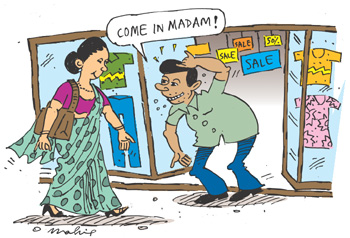Contemporary courtesy commodified
By Afreeha Jawad
 Despite religio/cultural contradictions if one could call it so in an
ordinary sense, there is this unquenchable thirst by a few whose moral
conscience is still awake, to maintain courtesy at all times. Yet,
they've been tested beyond limits of endurance in upholding such
courtesy, for in doing so they regret being taken for weaklings and even
down right fools. While there's no qualms about the second, the first
cannot certainly be entertained. I say this because to extend courtesy
even to the cunning, crafty and opportunistic milieu no doubt is naive
even though admittedly such refinement is the hallmark of a gentleman
provided it stems from within. But to connect such attribute to weakness
and to ride rough shod over one who extends such good will, using him or
her as a doormat denotes a shortfall in character and wholesomeness. Despite religio/cultural contradictions if one could call it so in an
ordinary sense, there is this unquenchable thirst by a few whose moral
conscience is still awake, to maintain courtesy at all times. Yet,
they've been tested beyond limits of endurance in upholding such
courtesy, for in doing so they regret being taken for weaklings and even
down right fools. While there's no qualms about the second, the first
cannot certainly be entertained. I say this because to extend courtesy
even to the cunning, crafty and opportunistic milieu no doubt is naive
even though admittedly such refinement is the hallmark of a gentleman
provided it stems from within. But to connect such attribute to weakness
and to ride rough shod over one who extends such good will, using him or
her as a doormat denotes a shortfall in character and wholesomeness.
Courteous ways
Take Shashi for instance - a quiet, submissive sales girl in a
Borella based grocery - one of the fifteen sales persons in the firm -
now, her employer Nihal Gunadasa believes it is her courteous ways that
makes the rest shout her down. May Lankavey Dan Inna Yakku Ohoma Thamai.
Ara Lamayage Kata Sera Nahaney. Ithin Okkoma Eyata Baninewa. Mitithenen
Thamai Watura Bahinney. ("She is a very courteous sort yet she is
shouted at. Water flows not up hill but down, isn't it?")
There's this some other guy who keeps complaining of his kindness
being taken advantage of. He resorts to a sort of self promise - an
unkept one - "No I will not be so kind in future," which has led him
into trouble brewing by the minute. Of late he has put his foot down and
now there's light at tunnel's end.
Kindness misused
Talking of kindness misused, I remember someone who cried out her
heart recalling her first few days in employment. Fresh out of school,
she joined the firm loaded with courtesy and kindness. She had to
finally do a double up in unloading all such when confronted with
insincerity. One shouted, "Astra Magarine," the other yelled, "there
comes Anchor Butter" and some other bawled out, "Anna Canola Enawa".
Relating all this to me, she almost broke down and with heavy heart
asked me, "Afreeha, why do they react like this. Why should I butter
these fellows when I don't need anything from them."
Today she has evolved into a terror and informs me of her
aggressiveness that found social acceptance.
Emanating from certain social quarters is that one need not be kind
and courteous. What sort of human wholesomeness that is supposed to be,
only God in heaven knows. Yet, there it is - take it or leave it.
Interestingly, the coin's other side in this whole episode adds food
for thought. Resorting to placating is nothing new under this
socio/econ/political setup. So, however well intentioned one may be in
extending courtesy, it is bound to be misunderstood for flattery - the
recipient of one's good will itself at one time or another resorting to
such modus operandi. Thus even though well meant, one can be easily
taken for a flatterer only by one such. Making matters worse is the
hospitality and services industries commodifying courtesy. What once
emanated from the heart's deep seated quarters and was part of being
human, is today "sellable". This then also contributes to large scale
suspicion over courtesy and kindness.
What was once emotion based feeling, today is reason based. In one
tradition and custom foundationed courtesy and kindness whereas the
other lays claim to the application of such only when needed. Modern
man's needs are ever expanding.
Constant manipulation is resorted to for him to arrive at these
needs. He knows whom to tap for what and as he finds his way through he
would stoop to anything but sincerity in getting what he wants. A
powerful tool he applies in the process is feigned kindness, flattery,
unbounded courtesy and cajoling.
Role model
What comes off the political/economic front also is 'role model' for
feigned kindness and however well meant one could be in extending
courtesy, the tendency to be misunderstood is always there. Even in
business such pretentious characteristics have contributed in mistaking
what is bona fide.
The endearing terms coming off a political platform such as Ammay
(mother), Akkay (elder sister), Ayiyey (elder brother) and Nangiye
(sister) (what of Thaththa (father) one may ask) sees the speaker
striking the 'affinity' chord at a very personal level through
biological lenses.
Contrastingly, inside a shop this takes on a status propelling role,
"come madam, what is it you want madam' - note the repetition and
emphasis on the word madam. Every other word will be followed by Madam
and by the time you leave, it'll be like you've been 'killed with
kindness'.
[email protected] |
